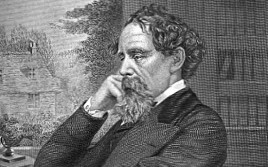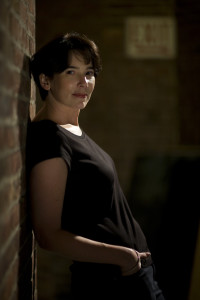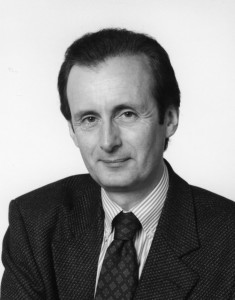Transcript
Liza Bel explores Charles Dickens’ relationship with France; his little-known passion for the French language, life and culture and his reaction to the French Revolution.
Liza Bel: This week I am taking you on a journey to France. But not on a soft seat of the Eurostar train but rather on a rough bench of a 19th century boat that used to take curious travellers across the Channel. One man crossed the Channel more than 20 times in these rough conditions and recorded his experience with a journalistic precision leaving incredible travel records and notes on the French life. His name is Charles Dickens. This bearded genius of English literature who conjures up true Britishness was a passionate Francophile and an avid traveller. But all we know about Dickens’ passion for France is ‘A Tale of Two Cities’, his timeless bestseller set to the backdrop of the French Revolution. Jill Santoriello in New York was the first to adapt the novel into a Broadway musical. I called her to ask about Dickens’ view of the French Revolution.
Jill Santoriello: I think Dickens had very mixed feelings about the French Revolution and I think he felt that the political, social and economic situation in France had made the revolution inevitable, but horrifyingly so. He was very concerned that the same thing might happen in England during his time because he was such a social advocate and cared very much about the way that people were treated. Then, as today, there were the ‘haves’ and the ‘have-nots’ and he was really concerned that the English people might decide to rise up and have their own revolution. So I think Dickens’ view of the revolution was of a healthy mix of understanding and fear. It was almost like reacting to lightning in that you need to get in the house and hide from it so that you don’t get hit. Revolutions were unavoidable if the social and economic ills that were prevalent in society were not addressed.
Liza Bel: So what is the role of the French revolution in your musical? A scene from ‘A Tale of Two Cities’
J S: It’s more of a plot a device to tell the main story, which is about Sydney, Lucie and Charles Darnay. The musical is essentially a romance set against the backdropof the French revolution. I try to remain faithful to as many of Dickens’ themes in telling that as I can. I don’t give short shrift to the revolution and we definitely spend a lot of time with Madame Defarge and the revolutionaries but the main focus is still Sidney.
L B: A Tale of Two Cities is probably the most renowned Dickens novel relating to France but it actually reveals very little about Dickens’ real passion for the French culture. One has to look into Dickens’ journalistic work and his letters to discover his deep knowledge and admiration of the lifestyle and society across the Channel. He even signed one of his letters, to his friend John Forster, “as a naturalised Frenchman, a citizen of Paris”. So it was John Edmondson, driven by his passion for the 19th century literature and France, who conducted meticulous research into Dickens’ relationship with France. He then published a book simply called Dickens on France that comprises of a collection of Dickens’ writings which relate to France, supported by John’s commentary. I met John Edmondson and started the interview by asking him how England and France actually perceived each other during Dickens’ time, a period not long after the Battle of Waterloo had added a bitter taste to the Anglo-French relationship.
John Edmondson: The main thing that happened after the Waterloo period was over was that France opened itself up to tourists quite significantly. In some ways it was a mirror of the situation now. There were a group of English people who liked France and another group who did not, who were insular and rather jingoistic. So that division existed at that time much as it does now. But the big change around the middle of the 19th Century, and this is when Dickens started to travel, was the revolution in transport and tourism, which became much more available for many people. For example, at the end of the 18th Century, the Grand Tour was really exclusively for the English aristocracy or the very rich middle classes, whereas by the middle of the 19th Century the middle classes were going across the Channel in droves to France and further afield. So because of that there was a kind of a rapprochement because there was an increasing familiarity between the middle classes of both countries. France then had many attractions that it has today, in the sense that it was fashionable, Paris was the place to be, there as also a kind of romanticisation: it was known as ‘the city of light’. I would say that on the whole Dickens wasn’t rare in wanting to go to France, what was rare was his particular appreciation of the place and the way that he used it.
‘Ah! The Fresh air is pleasant after the forcing-frame, though it does blow over these interminable streets, and scatter the smoke of this vast wilderness of chimneys. Here we are – no, I mean there we were, for it has darted far into the rear – in Bermondsey where the tanners live. Flash! The distant shipping in the Thames is gone. Whirr! The little streets of new brick and red tile, with here and there a flagstaff growing like a tall weed out of the scarlet beans, and, everywhere, plenty of open sewer and ditch for the promotion of the public health, have been fired off in a volley. Whizz! Dustheaps, market-gardens, and waste grounds! Rattle! New Cross Station. Shock! There we were at Croydon. Burrr! The tunnel.’ From “The Flight”, p.7.
L B: Based on everything you have read of Dickens’ adventures, could you describe the atmosphere of those journeys from London to Paris at the end of the 19th Century?
‘But, our French watering-place, when it is once got into, is a very enjoyable place. It has a varied and beautiful countryside around it, and many characteristic and agreeable things within it. To be sure, it might have fewer bad smells and less decaying refuse, and it might be better drained, and much cleaner in many parts, and therefore infinitely more healthy. Still, it is a bright, airy, pleasant, cheerful town; and if you were to walk down either of its three well-paved main streets, towards five o’clock in the afternoon, when delicate odours of cookery fill the air, and its hotel windows (it is full of hotels) give glimpses of long tables set out for dinner, and made to look sumptuous by the aid of napkins folded fan-wise, you would rightly judge it to be an uncommonly good town to eat and drink in.’
From “Our French Watering Place”, p.62.
J E: The title “Our French Watering Place” comes from a previous article that he wrote on Broadstairs which was one of his favourite English holiday destinations. In the 1850s Dickens stayed in Boulougne for three summers, spending several months there each time. Basically, because Boulougne became a favourite place, he reflected that in the title. The first essay was called “The Watering Place”, so he called Bolougne “Our French watering Place” and his readers would be able to link back and realise what he was saying simply from the title. The article itself is a sort of love letter to Bolougne; he writes in detail about what he likes in the town, the various characters he meets, for example, the landlord that he always stayed with.
L B: How come Dickens had this really unexplainable passion for Bolougne considering that at that time, and even now, it had a reputation as a boring and grim industrial town?
J E: Yes, well Dickens just found things in Bolougne that he liked. I think part of
his motivation for pushing it was because he liked to go against the grain. He says somewhere that, if Bolougne were three hundred miles further off, people would love it. It was just the fact that it was so close and actually had quite a lot of English residents that put others off. The fashionable tourist would go further afield, to Naples for example, or one of the main stops on the old Grand Tour. So to an extent I think that he took pleasure in countering that but there was also a genuine affection for it. He wasn’t alone actually because Thackeray also liked Bolougne.L B: There was an underground passion for Bolougne?
J E: It was indeed a minority passion. But Dickens was very pleased that he’d found
it. It was somewhere that he had a great affection for.
‘About Paris! I am charmed with the place, and have a much greater respect for the French people than I had before. The general appreciation of, and respect for, Art, its broadest and most universal sense, in Paris, is one of the finest national signs I know. They are ‘specially intelligent people: and though there still lingers among them an odd mixture of refinement and coarseness, I believe them to be, in many high and great respects, the first people in the universe.’
From “Pilgrim”, p.125 .
J E: The things in Paris that made an initial impact on Dickens would have been quite
simple things like the gas light, like people sitting outside in cafes, which was just not done in London. It was the attitude of people on the streets; he mentions quite frequently the common courtesy that people had. But I think you have to remember when talking about Dickens that he had a huge ability to read the city. He knew London intimately and he had a way of perceiving cities which is really quite rare. He applied this to Paris pretty much as soon as he got there. He wrote to his friend, just after his first visit in 1844, “I cannot tell you what an immense impression Paris made upon me. It is the most extraordinary place in the world. I was not prepared for, and really could not have believed it, it’s perfectly distinct and separate character”. So he did see it as somewhere completely different from London. In a sense there was a kind of culture shock, but a positive culture shock, in there for him. But as he got to know it very well over the years, because he went very many times, I would say that it became much more important than Bolougne. Bolougne was a place that he liked and developed an affection for, whereas Paris produced a much more profound reaction in him. It was really in Paris that he started to compare culture, politics and art to the detriment of Britain. And as he became increasingly dissatisfied with the state of his own nation as time went on, he became increasingly more attracted to what was going on in Paris and in other parts of France.
L B: So that changed his perception of his own country?
J E: It certainly helped to change it. I think his perception would have changed
anyway, but Paris provided an exemplar for him of how things might be.
‘The Englishman can’t speak a word of French, but the Frenchman can speak a very little English, with which he helps the Englishman out of abysses and ravines of difficulty. The Englishman instead of being obliged by this, condescends, good humouredly, to correct the Frenchman’s pronunciation – patronizes him – would pat him on the head, if he could reach so high – and screeches at his mistakes…’ From “Pilgrim”, p.311.
L B: So John, considering the massive passion that Dickens had for France, French culture, language and lifestyle, why has this insight been so ignored in the UK?
J E: Well that’s difficult to say. It has been recognised in academic circles for some time, with certain people having written about it. But certainly, until recently, it hasn’t been much known. It’s very difficult to say why, except for the fact that until the last twenty years the huge emphasis was on critical commentary of his novels. And it’s only recently that his journalism has come more to the fore, particularly with the marvellous full volume edition of his journalism edited by Michael Slater. I think that has brought other aspects of his interests and life into prominence. But you’re right, outside A Tale of Two Cities, very little attention was paid to his attitudes to France until comparatively recently.
L B: Can we actually confirm that Dickens was the first British Francophile that we know in history?
J E: I don’t know if I could make such a brave confirmation as that.
L B: Of his time?
J E: He’s certainly the first to be a Francophile in that way, to express that depth of Francophilia. There were many writers who liked and visited France but I’ll say a tentative ‘yes’ to that.
Tags: A Tale of Two Cities, Books, Charles Dickens, classics, Dickens on France, France, French Revolution, Jill Santoriello, John Edmondosn




Subscribe with…